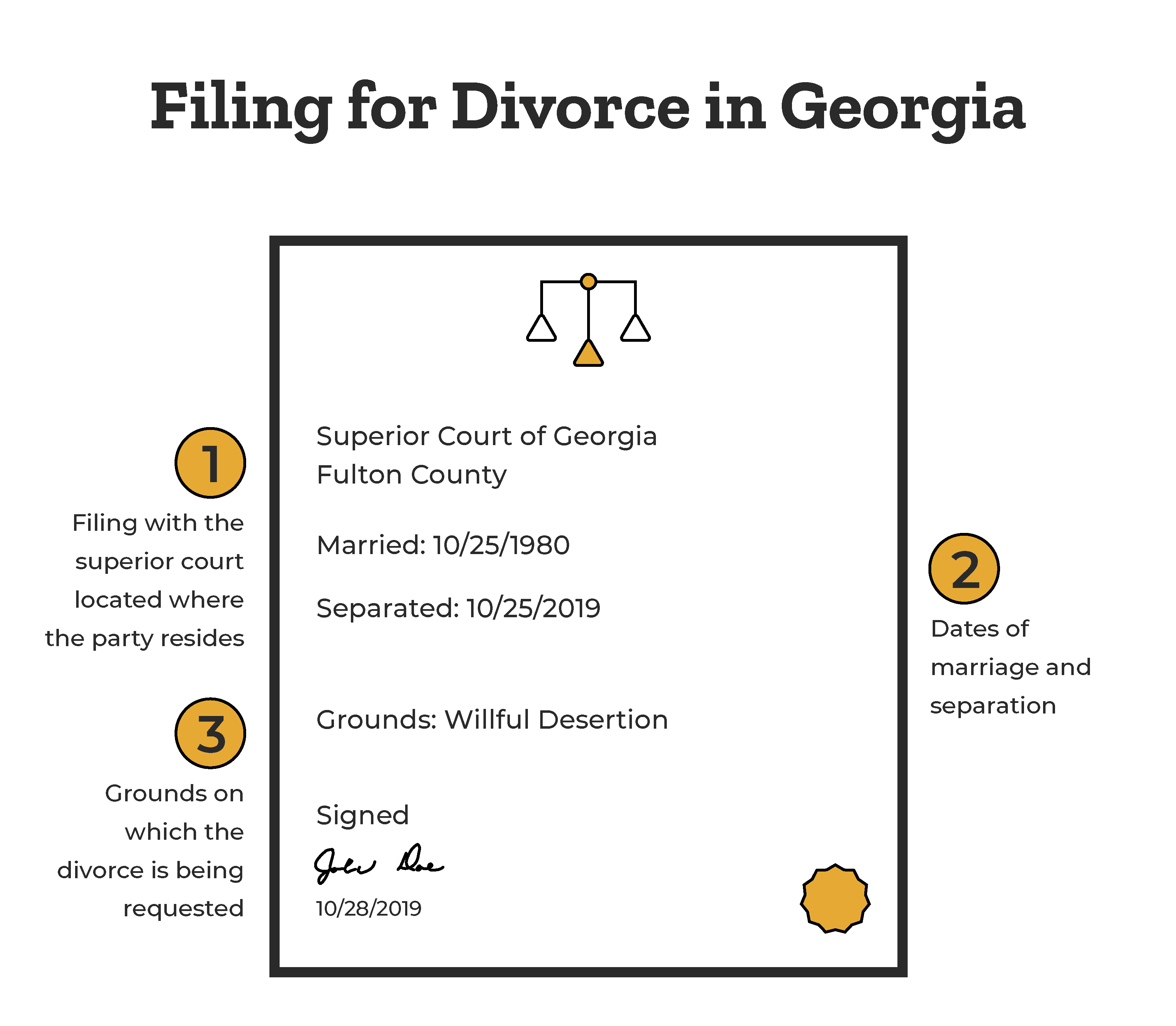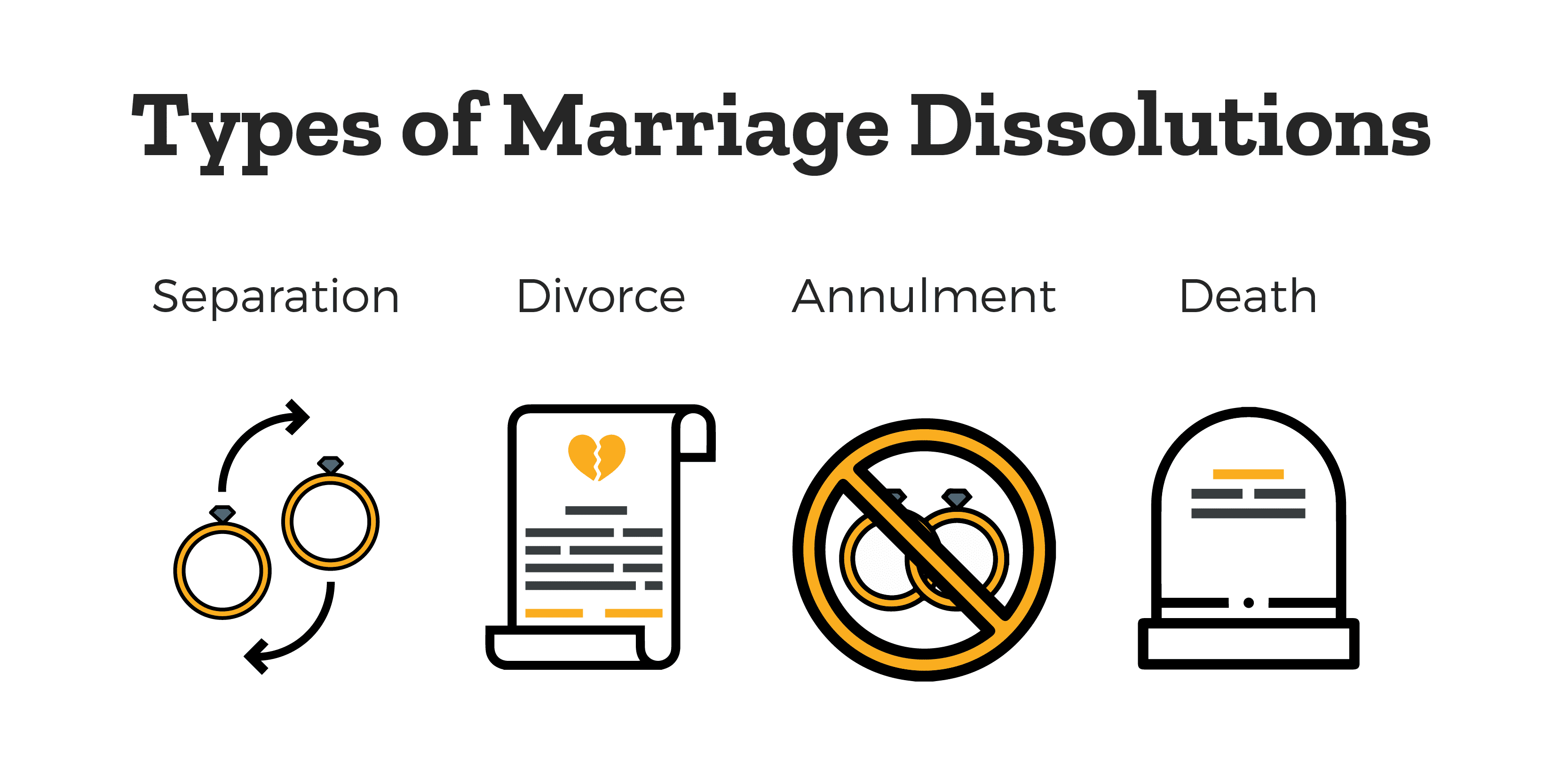Georgia’s family law and court process can be difficult to understand for someone just filing for divorce. Georgia’s divorce law can be found in the Official Code of Georgia Annotated, Title 19, Domestic Relations.
Georgia allows 13 grounds on which a petitioner can ask for a divorce, as found in O.C.G.A. 19-5-3 (2010). The most common divorce ground is “no-fault.” In a no-fault divorce, the petitioner claims that the marriage has become irretrievably broken and is asking for a divorce without blaming any person. The parties must have been irretrievably broken for a minimum of six months before filing the no-fault petition.
In a fault-based divorce, however, the petitioner brings forth allegations and assigns fault to the other person for the marriage ending. Georgia law is quite unique in that it offers 12 fault-based grounds for divorce. The 12 fault-based categories, found in O.C.G.A. 19-5-5 (2010), are as follows:
- Intermarriage by people within the prohibited degrees of kinship
- Mental illness at the time of the marriage
- Impotence at the time of the marriage
- Force, menace, duress, or fraud in obtaining the marriage
- Pregnancy of the wife by a man other than the husband at the time of the marriage and unknown to the husband
- Adultery during the marriage
- Willful desertion by either party for a period of one year
- Conviction of a crime involving moral turpitude, which results in a sentence of imprisonment for two years or longer
- Habitual intoxication
- Cruel treatment
- Conviction of a party for a crime of moral turpitude, which results in a prison sentence for two years or longer
- Incurable mental illness
- Habitual drug addiction, which involves addiction to a controlled substance
One can apply for one ground of divorce or can even list several grounds. For instance, one can file for divorce under both habitual intoxication and habitual drug addiction.
Process of Divorce
Georgia’s divorce proceedings are heard within the superior courts of the state. The divorce process first begins when the petitioner files a written petition to the superior court located where a party resides. The moving party must include the date of marriage, the date of separation, and on what grounds a divorce is being requested.

The superior court will also decide issues of child custody, child support, property division, and spousal support. The petitioner must also detail if there are any minor children shared between the spouses. In situations where property division and/or alimony is requested, the parties must also provide information related to marital assets and incomes.
How Long Does a Georgia Divorce Take?
The length of a divorce proceeding can also vary whether there is a prenuptial or postnuptial agreement. If such prenuptial or postnuptial agreement exists, then many legal issues, such as property division or spousal support, may have already been previously determined and agreed upon. The case can then move quickly.
The timeline of a Georgia divorce is relative to the couple and their circumstances. A divorce in which the parties reach an agreement and work together will be able to be finalized sooner than a divorce matter that is being contested. A fault-based divorce will also take longer than a no-fault divorce, as the defendant will need to respond to the allegations and provide any defenses to the fault alleged. They may even make a cross-motion, which puts the fault on the petitioner. As the facts and legal issues are in dispute, the parties will have to go to trial in the superior court for the judge to rule on the evidence presented.
An “uncontested divorce” is when both parties agree on the terms of the divorce. The parties settle all matters, including the property and finances. There is no dispute of facts, so the parties do not need to go to trial. Parties will bring the settlement agreement before a judge who can accept the settlement and give a final judgment of divorce to the parties.
Georgia’s law also allows for a family law judge to refer a divorce case to mediation, or alternative dispute resolution, before going to trial. Mediation is offered at no cost to parties to try to resolve their legal issues. In many cases, mediation will drastically shorten the time it takes for a final judgment of divorce. The parties will talk about their issues and arrange a settlement. The judge will consent to the settlement agreement that was mutually agreed upon in mediation. In other cases, however, the parties who do not reach a resolution will have to go before a judge. In these instances, the divorce may take many more months before it is finalized.
Mandatory Minimum Waiting Time
Georgia’s law states that a divorce cannot be finalized sooner than one month (31 days) after the serving of the divorce complaint. Therefore, an uncontested divorce can be finalized one month after the mandatory waiting period.
Residency Requirement
In this case, jurisdiction refers to the ability of the court to hear a family law case.
For jurisdiction in Georgia, either party must be a bonafide resident of Georgia for six months before the action. It is not required that both parties be residents of the state.
Generally, the action must be filed in the county of the defendant’s residence if the defendant is residing in Georgia. If the defendant, however, is not a resident of Georgia, then the action must be filed in the county where the petitioner has resided for the past six months. If the defendant is not a resident of the state, then he or she must have had minimum contacts with Georgia for the superior court to have jurisdiction.
A nonresident plaintiff can also file an action in Georgia in the county where the defendant resides. The action of filing a divorce in the state is the person’s way of consenting to that state’s jurisdiction (even though the petitioner might be residing in another state).
Separation of Property
Georgia’s family law follows the “equitable division of property” rule when it comes to determining marital assets during a divorce. Equitable division means that the property is split according to what is fair, which may not be a 50/50 split. Georgia follows the “source of funds” rule, which dictates that property division will be calculated according to how each partner contributed to that property.
Child Custody
Child custody determinations in Georgia are evaluated according to the “best interest of the child” standard. A judge looks at all factors they think relevant in regard to that particular child’s situation.
Child custody comes in two forms: legal custody and physical custody. Legal custody refers to the ability to choose the legal decisions for the child, such as schooling and medical decisions. Physical custody refers to the day-to-day decisions of the child, including where the child resides.
Custody arrangements in Georgia can be sole or joint. In sole custody, only one parent can make decisions regarding the child. In joint legal custody, both parents share in the responsibility to make decisions regarding the child. In joint physical custody, both parents have substantial time with the child and are involved in the child’s life.
Additionally, in Georgia, a child can choose their custody arrangement at age 14. As long as the court feels it is in the child’s best interest, then a child can choose the parent they want to have custody.
Child Support
Georgia follows an “income share” statute regarding child support. This means that the income of both parents will be taken into account when calculating the child support award. Child support is meant to help the noncustodial parent with the expenses of raising children.
Divorce Alternatives

There are other legal options in Georgia to end a marriage.
Georgia recognizes “legal separation,” where both parties continue to be legally married yet have decided to live separately. To do this, a “separate maintenance order” must be obtained in court by a judge. All legal issues of division of property, finances, alimony, and child custody or support are determined like in a divorce, but the parties are still married.
Some people might choose a legal separation in lieu of a divorce if they are still contemplating divorce but have not decided to divorce quite yet. Through a separation maintenance order, the parties can remain legally married, yet keep their finances and lives separate. A couple might choose a legal separation if they still want the benefits of married people, such as tax advantages, health insurance, or pension benefits. Others might choose legal separation for religious reasons.
Another less common way to end a marriage is an “annulment.” Annulment is different from a separation or divorce in that it doesn’t end a marriage but instead nullifies it so that the marriage never even existed. Annulments have strict requirements, and parties will have to show the marriage was invalid since the “inception.” O.C.G.A. 19-5-5 (2010)
Do You Need a Lawyer?
A person without a lawyer and representing themselves is called pro se. Depending on the complexity of the family law case, one might need to hire an experienced divorce attorney.
It is best to look for an attorney qualified in family law. It is also important to choose an attorney who not only practices in your state but also is located in your county or city. For instance, if your divorce case were in Atlanta, you would want an Atlanta-based divorce attorney. Retaining a law firm in a separate county can have disadvantages. Attorneys commonly charge by the hour, so you could incur additional costs related to travel.
In a pro se action, the costs simply consist of the filing fees. While it is much less expensive to do it yourself, divorce cases involve complex legal issues and can be very emotional. Many people will benefit from a divorce attorney to assist in litigating potentially intense matters.
Generally, law offices will provide a low cost or free consultation, so it is a good idea to consult with a divorce lawyer before deciding your strategy. There are many helpful resources online to help you find a family law firm or divorce attorney. One can reach out to a state bar association, which can provide referrals for divorce attorneys located in your county.
